In Part Three of the Tim Mountford story we learned what is was like to travel around Europe as part of the Stayer circus, racing behind the big motors as high speeds. In this final, Part Four of Tim’s interview, he tells us about some of the secrets to securing race contracts in the European Six Days, his favourite memories of top level track racing, some of the characters he conspired with, deciding to retire and open a chain of bike shops in Silicon Valley, and his induction into the US Cycling Hall of Fame.
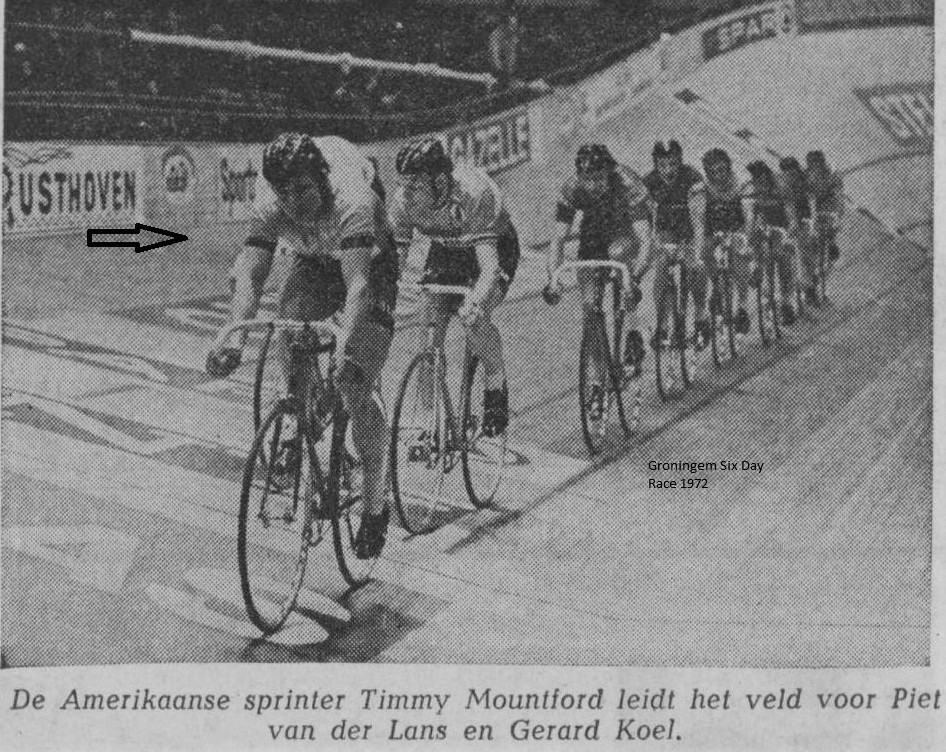
As an American, an outsider, what did you do to get the respect of the promotors and riders?
“In 1969 before venturing off into Six Day racing Jackie Simes and I concluded that to break into the Six Day circuit as an American team we would have to have character, show a little contempt, and demand respect from our European counterparts.
“To make a long story short, Jackie eventually re-established his friendship with Peter Post and Albert Fritz (who he almost popped in the nose during the Groningen Six).
“Jackie returned to the States in ’71 to successfully promote races in America.
“Of course, you have to race well, hold your position and complain when something doesn’t go your way; it’s about being visible and seizing the opportunity.
“Unlike road racing, in track racing there is the opportunity to network with promotors and riders to learn their personalities and develop contacts to get into future events. You have to get personal and with a little contempt make your demands.
“Once during a pro Omnium at the Dortmund Westfalenhallen track with a packed house of spectators and the media, the promoter from the Bremen Six Day race (Karl, I’ve forgotten his last name) approached me suggesting that I let his local rider Albert Fritz win our next sprint race.
“With a puzzled look and a slight smile I said, ‘do you realise that I can beat Albert with one leg?‘ In his dapper three-piece suit he stepped back with an indignant look on his face; ‘who the hell are you ?‘ Then I said, ‘I won’t tell anyone you asked me that, and I won’t make Albert look bad.’ I won second in the Omnium that night.
“A few weeks later I received a contract to his Bremen Six and Albert and I were on a pre-race TV show introducing the start of the race later that evening with Karl standing next to us smiling ear-to-ear.
“Another fun incident was one year before the start of the European Madison Championships at Antwerp; I showed up without a contract looking for a ride and Graeme Gilmore was there earlier for training and had his bike gear with him.
“I approached the race director Theo Ballemans in his office suggesting he should let Graeme and me ride as an English speaking team which should satisfy the new UCI rule that every pro team must be of the same country in championship races… He leaned back in his chair with a smile and hesitated…
“I knew he was thinking that we would be a good team to have in the race for the media but before he spoke, I said in my best Dutch ‘five hundred U.S. dollars to you, Theo, and we ride… what say you!?’ At first he was shocked at the bribe, then he broke into a laugh and he really got a kick out of the boldness of my request. It was the best thing that happened to him all day I think.
“Later I received a larger than normal contract for the next Antwerp Six and I like to believe it was because of the respect I got from Theo.
“So many fun stories, I could write a book.”
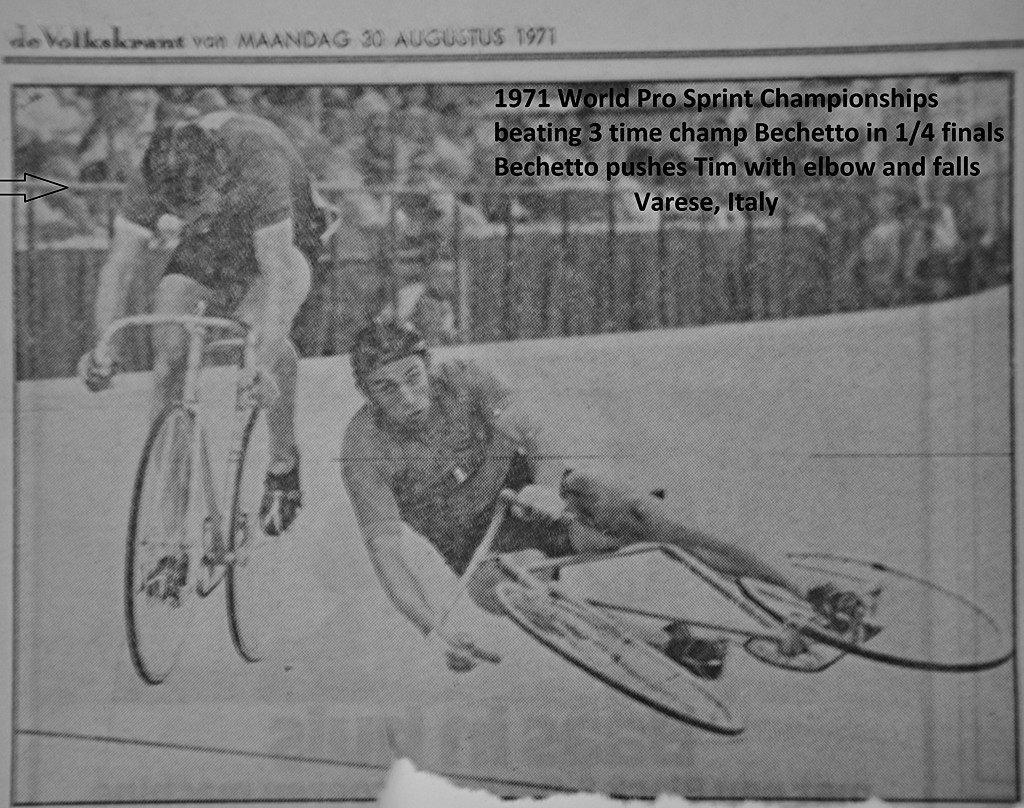
When and why did you quit racing?
“I had a lot of time to think during my nine-hour drive back to Rotterdam from the Munich Six where I got bumped.
“If a promotor can void a signed contract that easily, with no advanced notice and not pay me, then something was wrong.
“Prior to that I had a similar experience upon arriving in Spain with my soigneur and Dutch pacer Bertus de Graff for the 1973 World Motor Pace Championships – a costly trip – only to learn that the UCI decided that the driver and rider had to be of the same nationality in championship races.
“Although Europe had ‘free trade’ status, you can’t successfully sue the UCI in Switzerland.
“Without a podium in a European or World Championships, pro bike racing was becoming an uphill battle for me and I wasn’t getting any younger. Also, new riders from the ’72 Olympics like Udo Hempel were making their way into the pro Six Days by 1974.
“And then there was the arrival of this young Australian named Danny Clark who stayed with me in Rotterdam prior to moving on to Gent and a famously hugely successful career.
“So, I decided it was time to go home.
“Or so I thought…”
How did you cope with ‘no longer being a racer’?
“In hindsight, my decision to return to California with signed race contracts still on the table and a good team sponsor was premature and was based on my stubborn ego telling me that they cannot just bump me from a major race like the Munich Six Day.
“After a few days back in California I hit the panic button and decided that I wasn’t ready to quit! I missed my friends and the life I had in Rotterdam. I heard that same voice in my head from my days climbing Laurel Canyon at fifteen years old with my two friends; ‘I’m going to beat them. I’m not stopping!’
“I began searching for flights back to The Netherlands in time to fulfil my contracts but then, once again, my dear brother Stan saved me; he talked me out of going back, saying that I was just scared of the future.
“The following months I was confronted with an identity crisis and panic attacks – how do you go from the attention of thousands of spectators and media coverage starting at sixteen years old to overnight being a ‘nobody’ in your adult life?
“I couldn’t adjust to America lifestyle nor could I find a new identity, and I felt I had let myself down.
“After moving to Berkeley, my psychologist (who was a dear friend of mine) told me to get over it, NOW – and that people with PTSD take their own lives. I learned that professional cycling has one of the highest post career suicide rates of all sports. Okay, that was scary, and I snapped out of it.
“Fast forward to 1977… the following years I opened three bike shops in Silicon Valley, got married and had two more kids and life was good.
“I now have four adult kids all who are my best friends, and eight grandkids, and I ride 150 miles each week on the sunny California coast.
“However, I will always remember the words from an old Belgium soigneur; ‘if you can see then you can keep going, the wind is your friend, your time will come. Alle rit door (everyone rides through).'”
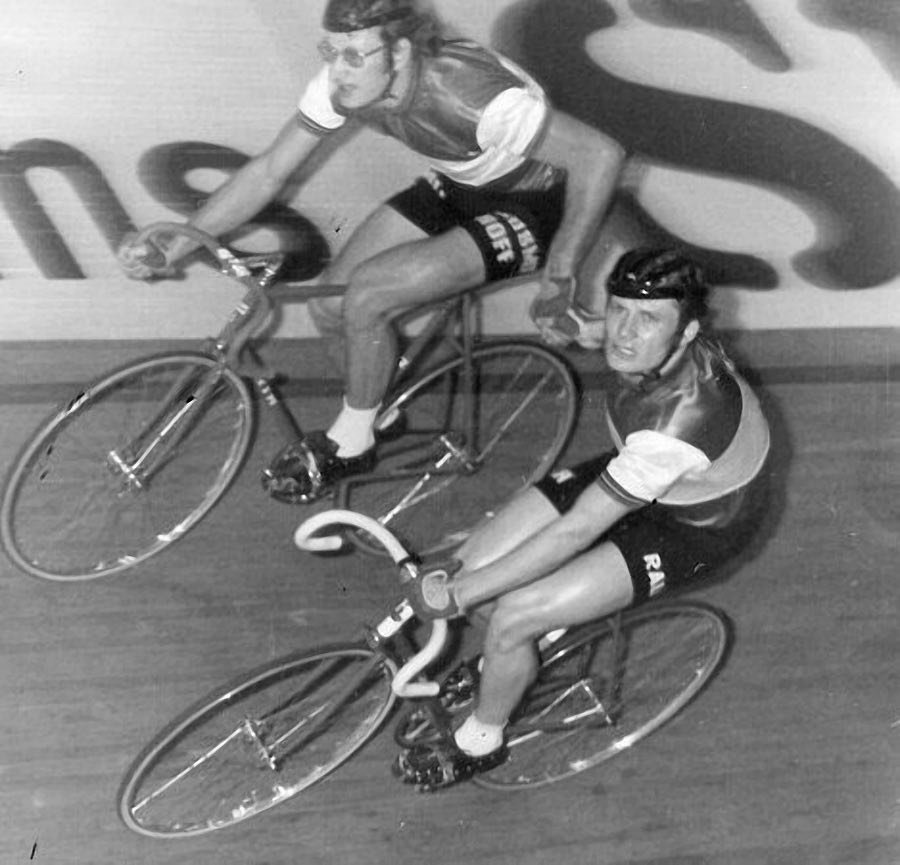
How was the bike shop owner experience?
“When I made the decision after Munich to return to the States I called my brother Stan who then lived in San Jose (in Silicon Valley) and we talked of opening a chain of bicycle stores in northern California.
“During the early 70’s Stan was the highest paid Raleigh salesman in the world until the bosses in England found out.
“So after a year in Berkeley getting my brains straightened out, I bought my brother’s bike shop in Cupertino, just down the street from the fledgling Apple Computer company, with Hewlett Packard and several other computer companies at that time all there too.
“Brother Stan pursued a successful career selling life insurance to insanely rich people in Silicon Valley. He discovered quickly that people with money have money problems, you just have to tell them.
“Later I opened two more bike stores in Silicon Valley, thereby allowing for more cost-effective purchasing, advertising, payroll and book-keeping.
“Looking back, I can say that Six Day racing gave me the energy and tenacity to make these stores successful and I often worked ‘Six Days’-a-week, with little sleep.
“I also sponsored a 70-man triathlon team co-sponsored by Adidas and Bianchi, and a 20 boy/girl BMX team, as well as promoting two-day bike tours every summer.
“I was living life.”
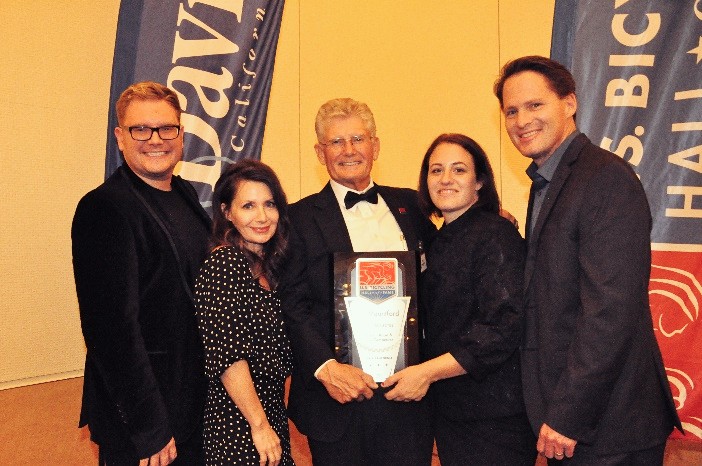
You’re a US Cycling Hall of Fame inductee – that must have been a proud moment?
“The best experience during my induction ceremony was that my four kids got to see an overview of my career and the depth of my commitment, and to meet many of my friends.
“It’s a bonus to my life and my career, and an honour to be recognised by my peers, family and close friends in the sport.
“Have a look at the Youtube video of my career:”
Which of your achievements gives you the most satisfaction?
“The race that stands out the most is the Wesfallahallen Christmas Eve event 1972 in Dortmund when I beat World Professional Sprint Champion, Robert Van Lancker coming from three lengths behind down the back stretch with Patrick Sercu glued to my back wheel and 13,000 spectators on their feet.
“The final sprint was myself wearing my red, white and blue stars and strip’s American jersey, Van Lancker wearing his current World Champion’s jersey and Sercu (a former World Champ) wearing the Belgium National Champion’s jersey.
“I led from the front brushing my right elbow on the balustrade while looking over my left shoulder with Sercu on my wheel followed by Van Lancker at three lengths back.
“I cranked up the speed at two and a half laps to go on the 200 meter track and I was hoping that Van Lancker would jump early for a long sprint. Note that Van Lancker can tell you when he is going to jump and then pull three lengths on you and smile at the same time, he was that good.
“So Van Lancker jumps … and pulls four lengths on me! Ouch! I hesitated a split second waiting to see if Sercu will go after him. Not going to happen.
“I snapped out of the saddle, dove off the banking and took off after Van Lancker, thinking that I am actually racing Sercu for second place and like a good Pro I had to make a show of it.
“Coming down the home stretch on the bell lap I noticed that I had closed in on Van Lanker and when I come out of turn two going down the back stretch I saw Van Lancker rocking in the saddle. I knew then that he had jumped too soon and was running out of gas.
“Also, I had seen his nerves get the best of him once, puking his guts out in the track tunnel one year before the finals of the Euro Sprint Championships in Rotterdam.
“I said to myself; ‘I can get him’ and I bolted out of the saddle down the back stretch, increased my leg speed and caught Van Lanker’s rear wheel draft in turn four and popped by him for the win by a half wheel, with Sercu sucking my rear wheel.
“Wow, all 13,000 spectators were on their feet cheering as I shot down the back stretch wearing my shiny Stars and Stripes USA jersey. Of course, back then that’s when America was actually ‘Great’ and Trump was busy bankrupting businesses.
“My agent Jan Dirksen bought me dinner that night and guaranteed me more contracts. Damn, I’m thinking that I am in the big time now! Eat your heart out Hollywood.”
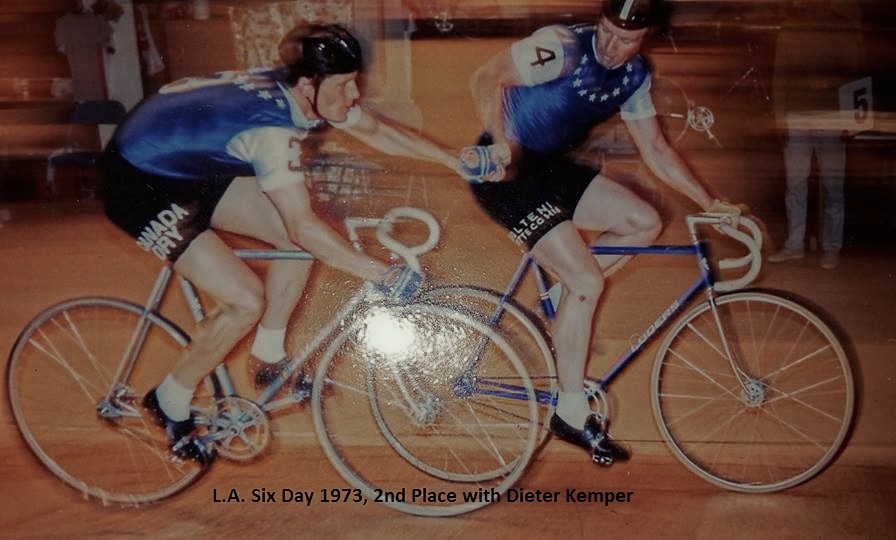
Is there anything you would do differently, given your time over?
“Hindsight is of course 20/20.
“I should have hired a strength training coach, and a nutritionist.
“Going for laps in a Six Day race or the final laps in a crit I obviously needed another two or three percent strength. Leg speed alone isn’t enough.
“I performed my best when Ron Baensch (RIP) helped me with my strength training for a period.
“And although I never won the World or European Championships, I have to say that my entire five years racing in Europe was in itself an achievement I greatly enjoyed and at the time was something no other American since the war had accomplished.
“Years later, I was the guest on two different Hollywood TV shows and I was honoured to continue to receive requests from around the world for my photo with autograph.
“I must give thanks to my Dutch friends Hans Gommers and his family, sprinter Rene Langkruis, and sweetheart Karen Vos for being such good friends and always looking after me during my time in Rotterdam. Also, to Dieter and Carola Kemper (RIP) for their hospitality and guidance.
“I quickly learned to appreciate the fact that I was living among a society in Europe that had been through a world war that shaped their values and a love for their neighbours. America is still a young country compared to Europe.
“Thanks for the interview Ed, this has been a nice walk.”
With huge thanks to Tim for his time putting this interview together. He went ‘Euro Dog’ way before 7-Eleven and Greg came along.



